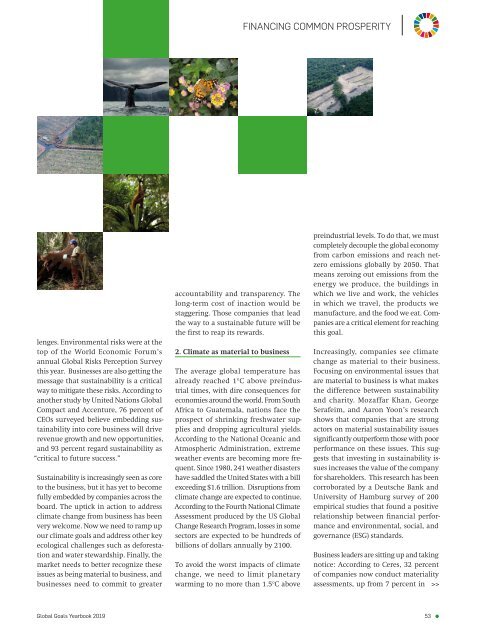Aliging Profit with Purpose - Global Goals Yearbook 2019
What are companies for? The rules for companies have changed. The focus is increasingly on their sustainable, social, and ecological impacts. The strategic orientation toward the so-called corporate purpose is decisive for profitable growth in the future. This currently results in a large number of questions for businesses: How do you find an inspiring and future-oriented corporate purpose, and how can it be aligned in such a way that it brings profitable growth and social responsibility in concert? The new 2019 edition of the Global Goals Yearbook offers answers to these crucial questions thanks to its consistent orientation toward the UN Sustainable Development Goals and a competent editorial board and author pool.
What are companies for? The rules for companies have changed. The focus is increasingly on their sustainable, social, and ecological impacts. The strategic orientation toward the so-called corporate purpose is decisive for profitable growth in the future.
This currently results in a large number of questions for businesses: How do you find an inspiring and future-oriented corporate purpose, and how can it be aligned in such a way that it brings profitable growth and social responsibility in concert? The new 2019 edition of the Global Goals Yearbook offers answers to these crucial questions thanks to its consistent orientation toward the UN Sustainable Development Goals and a competent editorial board and author pool.
Create successful ePaper yourself
Turn your PDF publications into a flip-book with our unique Google optimized e-Paper software.
FINANCING COMMON PROSPERITY<br />
lenges. Environmental risks were at the<br />
top of the World Economic Forum’s<br />
annual <strong>Global</strong> Risks Perception Survey<br />
this year. Businesses are also getting the<br />
message that sustainability is a critical<br />
way to mitigate these risks. According to<br />
another study by United Nations <strong>Global</strong><br />
Compact and Accenture, 76 percent of<br />
CEOs surveyed believe embedding sustainability<br />
into core business will drive<br />
revenue growth and new opportunities,<br />
and 93 percent regard sustainability as<br />
“critical to future success.”<br />
Sustainability is increasingly seen as core<br />
to the business, but it has yet to become<br />
fully embedded by companies across the<br />
board. The uptick in action to address<br />
climate change from business has been<br />
very welcome. Now we need to ramp up<br />
our climate goals and address other key<br />
ecological challenges such as deforestation<br />
and water stewardship. Finally, the<br />
market needs to better recognize these<br />
issues as being material to business, and<br />
businesses need to commit to greater<br />
accountability and transparency. The<br />
long-term cost of inaction would be<br />
staggering. Those companies that lead<br />
the way to a sustainable future will be<br />
the first to reap its rewards.<br />
2. Climate as material to business<br />
The average global temperature has<br />
already reached 1°C above preindustrial<br />
times, <strong>with</strong> dire consequences for<br />
economies around the world. From South<br />
Africa to Guatemala, nations face the<br />
prospect of shrinking freshwater supplies<br />
and dropping agricultural yields.<br />
According to the National Oceanic and<br />
Atmospheric Administration, extreme<br />
weather events are becoming more frequent.<br />
Since 1980, 241 weather disasters<br />
have saddled the United States <strong>with</strong> a bill<br />
exceeding $1.6 trillion. Disruptions from<br />
climate change are expected to continue.<br />
According to the Fourth National Climate<br />
Assessment produced by the US <strong>Global</strong><br />
Change Research Program, losses in some<br />
sectors are expected to be hundreds of<br />
billions of dollars annually by 2100.<br />
To avoid the worst impacts of climate<br />
change, we need to limit planetary<br />
warming to no more than 1.5°C above<br />
preindustrial levels. To do that, we must<br />
completely decouple the global economy<br />
from carbon emissions and reach netzero<br />
emissions globally by 2050. That<br />
means zeroing out emissions from the<br />
energy we produce, the buildings in<br />
which we live and work, the vehicles<br />
in which we travel, the products we<br />
manufacture, and the food we eat. Companies<br />
are a critical element for reaching<br />
this goal.<br />
Increasingly, companies see climate<br />
change as material to their business.<br />
Focusing on environmental issues that<br />
are material to business is what makes<br />
the difference between sustainability<br />
and charity. Mozaffar Khan, George<br />
Serafeim, and Aaron Yoon’s research<br />
shows that companies that are strong<br />
actors on material sustainability issues<br />
significantly outperform those <strong>with</strong> poor<br />
performance on these issues. This suggests<br />
that investing in sustainability issues<br />
increases the value of the company<br />
for shareholders. This research has been<br />
corroborated by a Deutsche Bank and<br />
University of Hamburg survey of 200<br />
empirical studies that found a positive<br />
relationship between financial performance<br />
and environmental, social, and<br />
governance (ESG) standards.<br />
Business leaders are sitting up and taking<br />
notice: According to Ceres, 32 percent<br />
of companies now conduct materiality<br />
assessments, up from 7 percent in >><br />
<strong>Global</strong> <strong>Goals</strong> <strong>Yearbook</strong> <strong>2019</strong><br />
53

















